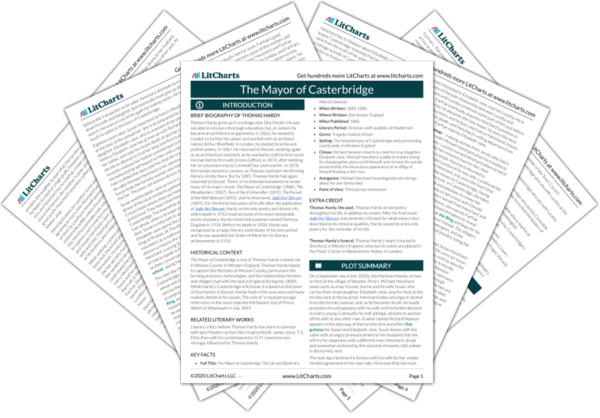The natural landscape of the English countryside is the source of livelihood for the inhabitants of Casterbridge. The chance occurrences of nature impact human fates and outcomes in the novel. A bad harvest causes Henchard to lose money reselling his grain when he attempts to drive Farfrae out of business. Henchard angrily says to Jopp after his loss, “you can never be sure of weather till ‘tis past.” Weather, although uncertain, hurts some and helps others. Farfrae is blessed by his harvests, as if he has the ability to foresee the weather. The unpredictable factor of the weather increases the emotional and economic divide between Henchard and Farfrae, and further angers and frustrates Henchard.
Yet, Henchard is also saved by the natural world. The river sweeps Henchard’s effigy to him, which stops him from killing himself. While Henchard attributes his survival to the skimmington with the effigies, it is the chance movements of the river that present the effigy to him at the critical moment. The landscape affects and reflects human emotions. Like a human character, the landscape is changeable, dynamic, and expressive, while directly affecting the plot of the novel. The rural farmers see a “god” in the weather directing their lives. Because of its direct affects on the villagers’ livelihood, “sun elated them; quiet rain sobered them; weeks of watery tempest stupefied them.”
Humans and Nature ThemeTracker

Humans and Nature Quotes in The Mayor of Casterbridge
In contrast with the harshness of the act just ended within the tent was the sight of several horses crossing their necks and rubbing each other lovingly as they waited in patience to be harnessed for the homeward journey. Outside the fair, in the valleys and woods, all was quiet. The sun had recently set, and the west heaven was hung with rosy cloud, which seemed permanent, yet slowly changed. To watch it was like looking at some grand feat of stagery from a darkened auditorium. In presence of this scene after the other there was a natural instinct to abjure man as the blot on an otherwise kindly universe; till it was remembered that all terrestrial conditions were intermittent, and that mankind might some night be innocently sleeping when these quiet objects were raging loud.
"If anybody will tell me how to turn grown wheat into wholesome wheat I'll take it back with pleasure. But it can't be done."
The farmer's income was ruled by the wheat-crop within his own horizon, and the wheat-crop by the weather. Thus in person, he became a sort of flesh-barometer, with feelers always directed to the sky and wind around him. The local atmosphere was everything to him; the atmospheres of other countries a matter of indifference. The people, too, who were not farmers, the rural multitude, saw in the god of the weather a more important personage than they do now….After midsummer they watched the weather-cocks as men waiting in antechambers watch the lackey. Sun elated them; quiet rain sobered them; weeks of watery tempest stupefied them. That aspect of the sky which they now regard as disagreeable they then beheld as maleficent.
When within a few yards of Farfrae's he saw the door gently opened, and a servant raise her hand to the knocker, to untie the piece of cloth which had muffled it. He went across, the sparrows in his way scarcely flying up from the road-litter, so little did they believe in human aggression at so early a time.
"Why do you take off that?" said Henchard. She turned in some surprise at his presence, and did not answer for an instant or two. Recognizing him, she said,
"Because they may knock as loud as they will; she will never hear it any more."
In the circular current imparted by the central flow the form was brought forward, till it passed under his eyes; and then he perceived with a sense of horror that it was himself. Not a man somewhat resembling him, but one in all respects his counterpart, his actual double, was floating as if dead in Ten Hatches Hole. The sense of the supernatural was strong in this unhappy man, and he turned away as one might have done in the actual presence of an appalling miracle. He covered his eyes and bowed his head. Without looking again into the stream he took his coat and hat, and went slowly away.
“That performance of theirs killed her, but kept me alive!”
Very often, as he wandered on, he would survey mankind and say to himself, "Here and everywhere be folk dying before their time like frosted leaves, though wanted by the world, the country, and their own families, as badly as can be; while I, an outcast, an incumbrance, wanted by nobody, I live on, and can’t die if I try.”
MICHAEL HENCHARD'S WILL
"That Elizabeth-Jane Farfrae be not told of my death, or made to grieve on account of me.
"& that I be not bury'd in consecrated ground.
"& that no sexton be asked to toll the bell.
"& that nobody is wished to see my dead body.
"& that no murners walk behind me at my funeral.
"& that no flours be planted on my grave,
"& that no man remember me.
"To this I put my name.
MICHAEL HENCHARD











